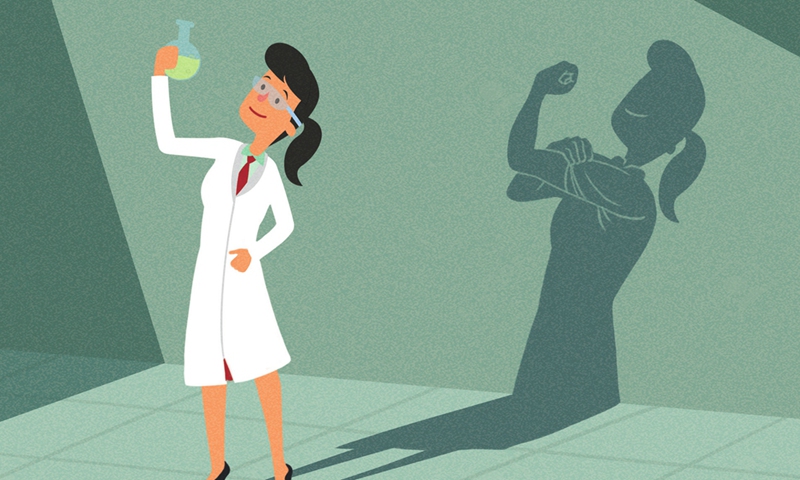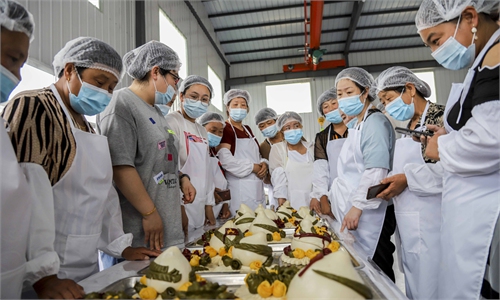China to amend law on protection of women's rights and interests, to define meaning of female discrimination for 1st time, ban mind control acts

Chinese women's rise
China will amend the Law on the Protection of Women's Rights and Interests, which will define the specific meaning of "discrimination against women" for the first time, and also prohibit acts of mind control against women, stipulating that so-called girl's morals schools and PUA (pick-up artist) moves, including euphemisms for mind control, brainwashing and suppression, are illegal.
The draft amendment was submitted to the Standing Committee of the National People's Congress (NPC) for deliberation on Monday, marking another major adjustment to the law since it came into force nearly 30 years ago.
As women are still the main victims of sexual harassment, China's first Civil Code - which came into force on January 1 - made provisions in principle for sexual harassment. But in view of the difficulty in identifying sexual harassment in practice, the draft clarifies the main forms of sexual harassment, which will be more directive and practical.
According to the draft, sexual harassment against a woman's will be prohibited in ways that involve words with sexual connotations or innuendo; inappropriate and unnecessary physical behavior; displays or dissemination of images, text, information, audio or video with obvious sexual significance; or acts that imply that there will be some benefit in developing a private or sexual relationship.
The draft stipulates that women who are victims of sexual harassment can file complaints with relevant units and authorities. These units and authorities shall handle complaints promptly and inform the victims of the results in writing. The female victims may either report the case to a public security organ or file a civil lawsuit with a people's court.
The draft adds the meaning of "discrimination against women" and stipulates that the country shall take necessary measures to gradually improve the protection of women's rights and interests, eliminate all forms of discrimination against them, and prohibit discrimination or restrictions on women's enjoyment and exercise of their rights and interests.
In light of the current move to promote gender equality, the draft adds provisions on temporary special measures to accelerate the realization of de facto equality between men and women.
According to the draft, unless stipulated by the state, employers are not allowed to do the following in the recruitment process: limit recruitment to men or give them priority; in addition to basic personal information, make further inquiries or investigations of female applicants' marriage, parental status and their plans for marriage and childbearing; include pregnancy tests in medical examinations for employment; impose restrictions on marriage and childbearing as conditions of employment; or take other actions to refuse to employ women on the basis of sex or raise women's employment standards in a differentiated manner.
The draft also improves the mechanism for eliminating gender discrimination in the workplace, which includes promoting collective contracts for the special rights and interests of female employees and establishing a reporting system for gender equality in enterprises.
In recent years, non-violent acts including brainwashing, manipulation of women and instigation of female suicide have been reported. For example, some local law enforcement authorities have investigated organizations and individuals conducting PUA-related training and online sales courses. In addition, the so-called girls' morals schools using verbal abuse, and the contemptuous destruction of female dignity to poison women, have emerged in recent years.
In response to these situations, the draft bans violence against women through mind control, or through the sale and illegal adoption of girls.
The draft stipulates that if a woman undertakes more obligations such as raising children, taking care of the elderly or assisting her husband at work, she has the right to demand compensation from her husband in case of divorce.
The method of compensation shall be agreed on by both parties, and if no agreement can be reached, a lawsuit may be brought before a people's court, according to the draft.
This clause especially attracts attention from netizens after Chinese-American singer-songwriter Wang Leehom's marriage scandal cast a public spotlight on the protection of "desperate housewives"
The draft has made the rounds on social media with floods of netizens giving it a thumbs-up while some called for the implementation of the law in daily life.
A senior staff member of the local women's federation in Nanchang, East China's Jiangxi Province told the Global Times that the key is to promote knowledge of and education about the law, and improve public awareness by such means as holding training sessions, launching knowledge contests, advertising on social media platforms and via TV projects.
The staff member said the women's legal aid center and hotlines, as well as women's and children's rights and interests groups, which have been set up in many areas in China, are effective.
Refuting foreign media, which claimed the amendment "comes after government suppression of the #MeToo movement," Chinese observers stressed the country's protection of women's rights and interests has been improving.
The State Council, China's cabinet, unveiled the Outline of Women's Development in China (2021-30) to promote gender equality in September 2021.
In September 2020, UN Undersecretary-General and Executive Director of UN Women Phumzile Mlambo-Ngcuka lauded China's achievements in promoting women's rights. Since 2012, China has lifted approximately 41 million women out of poverty by creating opportunities for income generation and jobs, she said.


